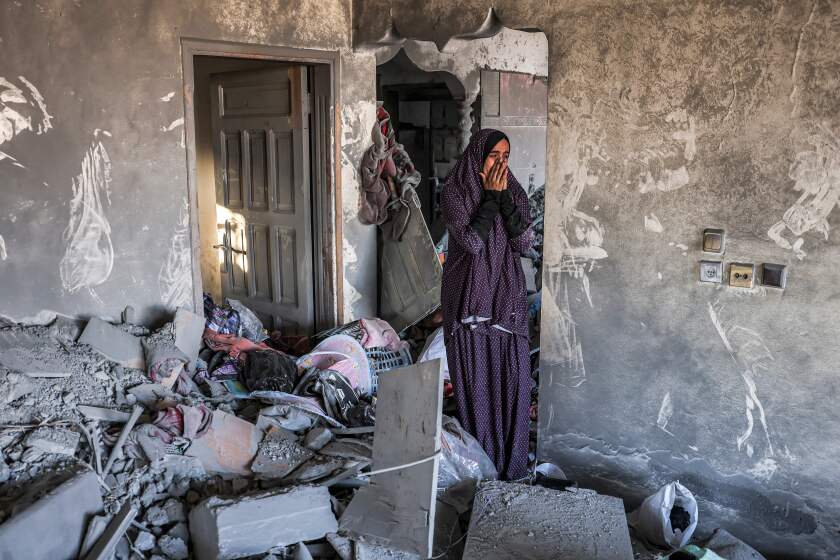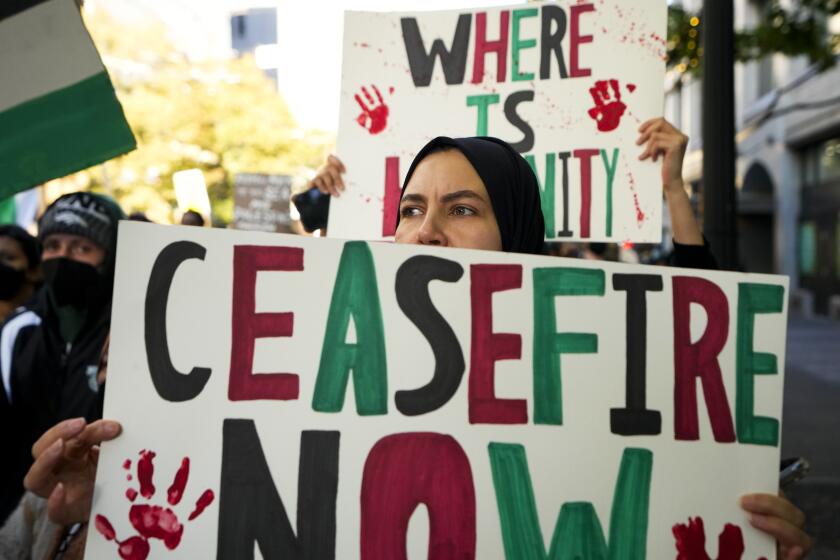
The skewed numbers of those killed in and around the Gaza Strip so far — around 1,200 Israelis and 15,000 Palestinians — in the latest phase of a more than century-long conflict point to the enormous disparity between these two sides.
These numbers are characteristic of colonial wars, one of many facts often obscured by the media, as are the nature and origins of this war. This is not simply a straightforward struggle between two sovereign peoples, such as France and Germany. Instead, this is the last colonial war in the modern age, fought to establish the hegemony and the absolute rights of one people over the other, as expressed in the 2018 “Nation State of the Jewish People” law, which states that the right to national self-determination in Palestine “is unique to the Jewish People.”
Imagining possible futures beyond Israel’s Jewish supremacy is a political act for me, rooted in my people’s history.
Despite the unquestionable connection of Judaism and the Jewish people to the Holy Land, for Palestinians this is an anti-colonial struggle. Israel was established as a European settler colonial project — something none of its early leaders denied — with the indispensable assistance of British imperialism.
Notwithstanding the web of myths created to conceal these facts, they are vital to understanding that the Palestinians would have resisted any group that tried to wrest their land from them, whatever their religion or nationality. That this group happened to be Jews with a national project, a deep connection to the same land and a history of persecution and dispossession elsewhere, culminating in the Holocaust, gave this war its particularly desperate nature. But in one sense the pattern of conflict played out over the last century is familiar.
The current truce is an important step. But the U.S. government should join in global calls for a cease-fire in Gaza.
Whoever the settlers were and wherever they came from, with whatever connections to the land, the resistance to them would have been essentially the same as that of the Irish, Algerians, Native Americans, Zulus or Libyans to intruders bent on expelling them and taking the land. Vladimir Jabotinsky, founder of the Revisionist Zionism that produced the Likud Party, stated bluntly: “Every native population in the world resists colonists.” And as Edward Said noted, it was the particular misfortune of the Palestinians to be the victims of victims.
This process of settler colonialism produced the dispossession of a large part of Palestine’s native population and the theft of their lands and property. This was achieved through the expulsion of 750,000 Palestinians during Israel’s establishment in 1948 (over 55% of the total Arab population of Palestine at the time), and of over 250,000 in 1967, with none of them allowed to return. This phased ethnic cleansing was essential in order to turn a majority-Arab country into a majority-Jewish state. It could not have been done in any other way, since it proved to be impossible to “spirit” the Palestinians “discreetly” out of the country, a desire that Theodor Herzl confided to his diary. For the last 56 years, these same practices of colonization and dispossession have proceeded inexorably in the occupied West Bank, East Jerusalem and the Golan Heights.
Of the nearly 7,000 Palestinians held by Israel, the majority have never been convicted of a crime, including more than 2,000 held in administrative detention, in which the Israeli military can hold a person without charge or trial.
The United States has regarded the military occupation of these territories and their gradual annexation and absorption into Israel with studied indifference for more than half a century. This contrasts glaringly with its muscular response to Russian occupation of part of Ukraine for a much shorter period. It is hard to give credence to U.S. claims about supporting self-determination and freedom for Ukraine while it has provided decades of essential support to Israel for its occupation of Arab territories. Indeed, the Trump administration’s recognition of Israel’s illegal annexations of East Jerusalem and the Golan Heights has not been reversed by the Biden administration.
Although the United States has strongly supported Israel in every one of its wars since 1948 (with the exception of the 1956 Suez war), its support for this total war on Gaza is unprecedented in several ways.
The doctors I’ve worked with to build an advanced pediatrics system in Gaza now find that dream shattered. Children can’t get even the most basic care.
One is President Biden’s blanket rejection of a cease-fire — the words have become taboo in his administration — and his full-throated support for the Israeli war aim of “destroying Hamas,” apparently to be achieved with massacres of thousands of civilians and the devastation of the entire Gaza Strip, home to 2.3 million people. In an op-ed article in the Washington Post, Biden supported this aim, saying that “Israel must defend itself. That is its right,” while claiming to support a two-state solution. He concluded this lengthy piece without ever mentioning two of the main obstacles to such a solution: Israel’s occupation and settlements, obstacles that the U.S. has for decades assiduously helped to maintain with a flood of arms and a spate of United Nations Security Council vetoes.
Another is Biden’s commitment of major U.S. naval, air and land assets to the region, presumably to prevent a widening of the conflict. This has been coupled with the delivery to the Israeli military of 2,000 Hellfire laser-guided missiles and 36,000 rounds of 30-millimeter cannon ammunition for Apache gunships, as well as 1,800 M141 bunker-buster shoulder-fired rockets (1,200 more are on order), with 57,000 155-millimeter artillery shells on order.
The Biden administration is asking Congress to appropriate an additional $14.3 billion in assistance, including military aid (in addition to the annual $3.8 billion in military grants), to cover these and other purchases, while asking that legal restrictions on the use of these weapons and munitions be waived. Many, if not most, of the civilians in Gaza who have perished so far died under a hail of American-supplied bombs, artillery shells, rockets and missiles. Since Oct. 7, Israel has killed more Palestinians, and driven more of them from their homes, than was the case during the Nakba of 1948, when 13,000 Palestinians died, according to Palestinian historian Aref al-Aref.
An expanded Palestinian government and PLO — including Hamas — must rule Gaza and the West Bank and negotiate to establish a Palestinian state.
Yet another unprecedented element has slipped under the media radar. This was U.S. support at the outset of the current war for Israel’s pushing all or part of the population of the Gaza Strip into Egypt. This support was never avowed, but was revealed by the fierce rejections of the proposal by Egypt and Jordan, and by the White House’s funding request to Congress on Oct. 20 for aid for Ukraine and Israel. This included “Migration and Refugee Assistance” funding for “potential needs of Gazans fleeing to neighboring countries,” for “displacement across border[s],” and for “programming requirements outside of Gaza.” Not surprisingly, Egyptian and Jordanian leaders furiously and publicly denounced this idea, which has since been disavowed by the administration. Biden has repeatedly hastened to affirm to the leaders of Egypt and Jordan that the U.S. would not support the expulsion of Palestinians into the territory of either country.
This disgraceful episode is only the latest sign that Biden does not really see the Palestinians as the equals of the Israelis, or regard their suffering in the same way as he sees that of Israelis. He and other older members of the American political leadership of both political parties remain locked into narratives formed decades ago, and resist tenaciously the newer perspectives of younger government staffers and congressional aides. This has been a calamity for Palestinians, especially those in the Gaza Strip, who have paid dearly for the blind one-sidedness of Biden and his generation.
A recent NBC poll found that 70% of voters in the 18-to-34 age group disapprove of Biden’s handling of the war on Gaza. It would be a bitter irony if this alienation, and similar levels of disenchantment among Arab, Muslim and other minority voters, result in Biden losing swing states like Michigan in 2024, leading to the election of a Republican president, who is likely to be even more anti-Palestinian.
Rashid Khalidi is the author, most recently, of “The Hundred Years’ War on Palestine: A History of Settler-Colonialism and Resistance, 1917-2017” and a professor of modern Arab studies at Columbia University.
More to Read
A cure for the common opinion
Get thought-provoking perspectives with our weekly newsletter.
You may occasionally receive promotional content from the Los Angeles Times.















